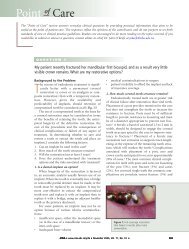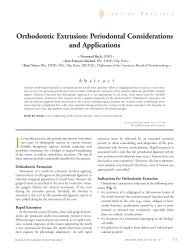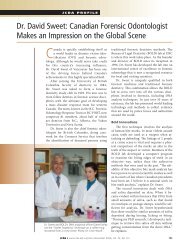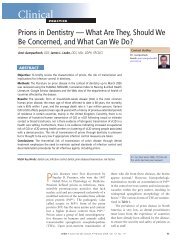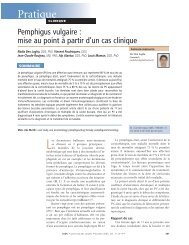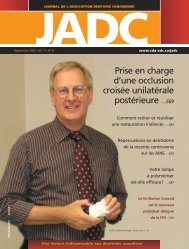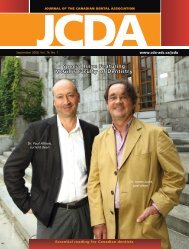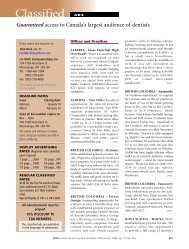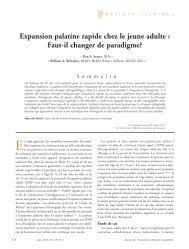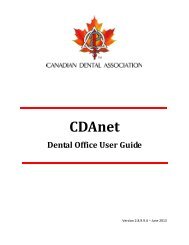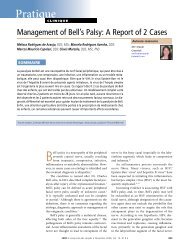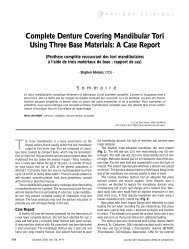JCDA - Canadian Dental Association
JCDA - Canadian Dental Association
JCDA - Canadian Dental Association
You also want an ePaper? Increase the reach of your titles
YUMPU automatically turns print PDFs into web optimized ePapers that Google loves.
The oral health of <strong>Canadian</strong>s and<br />
the infrastructure of the dental<br />
profession were the two main<br />
themes of CDA president Dr. Louis<br />
Dubé’s pre-budget presentation to the<br />
House of Commons Standing Committee<br />
of Finance, delivered on September 30.<br />
Dr. Dubé described the plight of many<br />
<strong>Canadian</strong>s who don’t have access to<br />
proper oral health care: “In my practice in<br />
Sherbrooke, not a day goes by that I don’t<br />
have to extract a tooth. We don’t have<br />
fluoridation, either, so kids are still<br />
getting lots of cavities. It’s sad to see a child who is financially<br />
disadvantaged and who goes to school with a mouth<br />
full of cavities which cause him to suffer pain and make it<br />
hard for him to eat nutritious foods, sleep or concentrate in<br />
school.<br />
“Most dental screening programs in schools were the<br />
victims of cutbacks, so how are these kids getting oral<br />
health care?” Dr. Dubé asked. “Many dentists work for no<br />
fee where they see a real need, but we can’t do this alone.<br />
We notice that many people are showing up in hospital<br />
emergency wards to be treated for oral<br />
health-related problems. We need to<br />
find ways to meet the needs of people<br />
who are not able to access dental care<br />
because of financial barriers.”<br />
Dr. Dubé wondered what will<br />
happen once aging workers retire and<br />
lose their dental plans. He suggested to<br />
the committee that systems be set up<br />
now to address the needs of older<br />
patients, before the majority of the baby<br />
boomer generation retires from the workforce. “These are<br />
people with high expectations in terms of the oral health<br />
care they receive, and they’re not going to settle for secondbest,”<br />
he predicted.<br />
Researchers are getting closer to establishing a definite<br />
link between the health of the mouth and the health of<br />
the rest of the body. “If your mouth is sick, the rest of<br />
your body is affected — and the effects may be quite<br />
major,” Dr. Dubé stated. “We don’t have all the answers<br />
yet, but it’s starting to look like periodontal disease may be<br />
a complicating factor in heart disease, pre-term and lowbirth-weight<br />
babies, and diabetes. These are big health<br />
concerns, both in terms of their impact on quality of life<br />
and their costs to the health care system. If it turns out that<br />
dentists can help to prevent or reduce the severity of these<br />
illnesses, so much the better.”<br />
Journal of the <strong>Canadian</strong> <strong>Dental</strong> <strong>Association</strong><br />
CDA: Year in Review<br />
CDA President Addresses Finance Committee<br />
Dr. Louis Dubé<br />
As for the health of the dental profession,<br />
Dr. Dubé said he was very concerned<br />
about high tuition fees and their impact<br />
on the makeup of the profession.<br />
“Dentistry has the highest fees of any<br />
program and we’re still concerned about<br />
that, so I encourage you to recommend<br />
the implementation of changes that will<br />
directly assist students,” he said. “Over the<br />
past year, though, we’ve come to realize<br />
that tuition fees are not the real problem,<br />
but a symptom of it, and that is the underfunding<br />
of universities. Operating dental<br />
schools is very expensive. The equipment<br />
and maintenance fees, as well as the operation of public<br />
clinics — these all add up in terms of cost. Good faculty<br />
is hard to find and even harder to keep. As things stand,<br />
university salaries cannot compete with incomes in private<br />
practice, so it’s hard to interest new graduates in the academic<br />
life — especially if they graduate with a debt of more<br />
than $100,000.”<br />
As well, academics are finding research grants harder<br />
to obtain. “Two years ago, we reported to you that<br />
the <strong>Canadian</strong> Institutes of Health<br />
Research was devoting only 1.6%<br />
of its funding to oral health<br />
research,” Dr. Dubé pointed out.<br />
“Since about 7% of health care<br />
spending in Canada is on oral<br />
health, we thought this percentage<br />
was too low. Since then, the situation<br />
has worsened. In the past year,<br />
less than 1% of funding was directed<br />
to oral health research.<br />
“Without dental schools, we have no dentists,” Dr. Dubé<br />
summed up. “Without research, we have no improvements<br />
to oral health. These are fundamental issues that we want<br />
to work with you to resolve.”<br />
Another concern is the issue of parental leave. Dentistry<br />
is quickly becoming a profession with equal participation<br />
of men and women. Often, once a dental practice is established,<br />
it evolves into a family business, where both spouses<br />
are dentists or one is a dentist and the other manages the<br />
office.<br />
But because Employment Insurance (EI) is unfairly<br />
structured, neither spouse is eligible to take parental leave,<br />
Dr. Dubé noted. “In order to make infant care financially<br />
affordable for dentists, staff and other health care workers,<br />
CDA recommends that the EI Act be revisited, with a view to<br />
including opt-in provisions for self-employed entrepreneurs<br />
High dental tuition<br />
fees are a symptom<br />
of the underfunding<br />
of universities.<br />
November 2003, Vol. 69, No. 10 649



